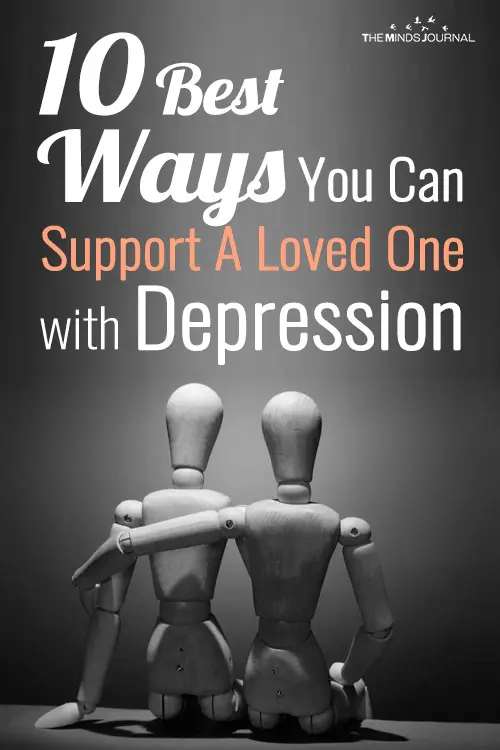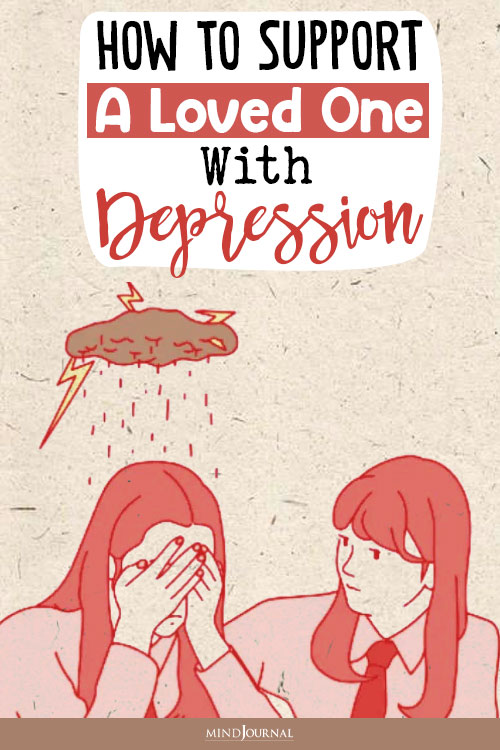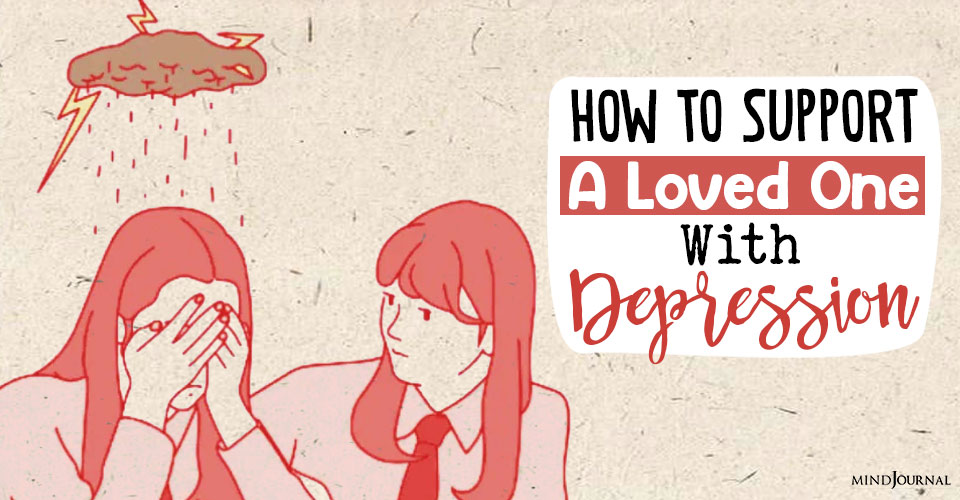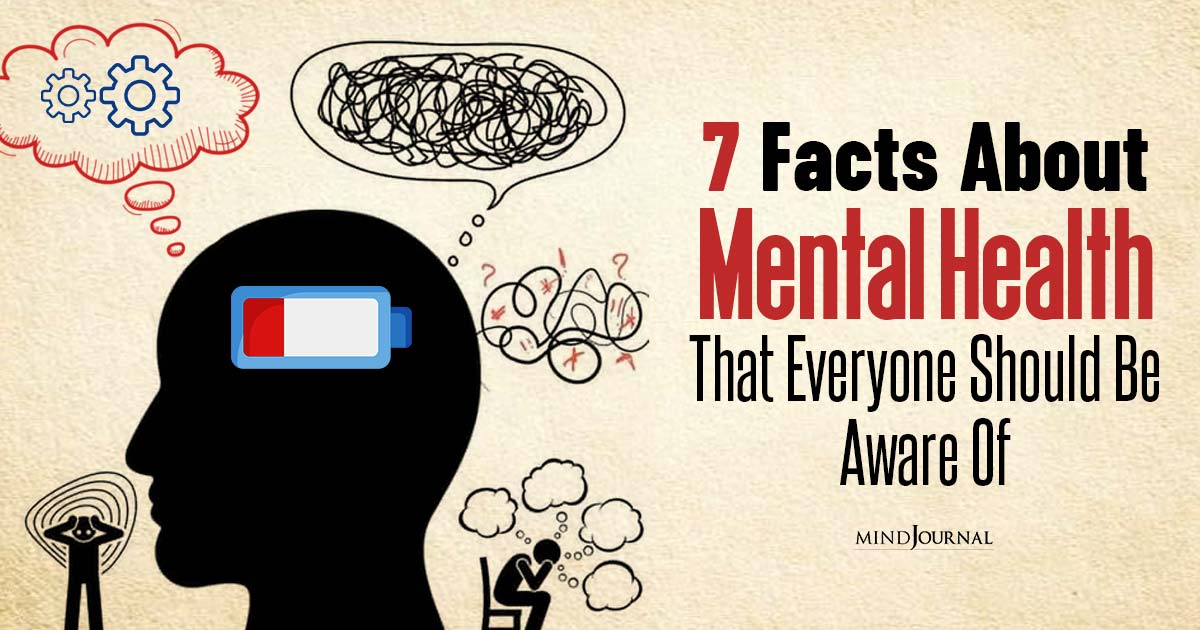Dealing with a depressed spouse or a loved one seems daunting especially when you don’t know how to help a loved one with depression. This article can help you learn how to support a loved one with depression.
If you want to support a depressed loved one, you will need to know a few things about depression itself and how to help effectively.
“Once you choose hope, anything is possible.” —Christopher Reeve
Depression affects people’s careers, sexuality, physical health, and emotional health. But one effect is often ignored because it resides in the periphery. Family, friends, spouses, children, and significant others are greatly influenced by their loved one’s depression. They too carry the burden of depression.
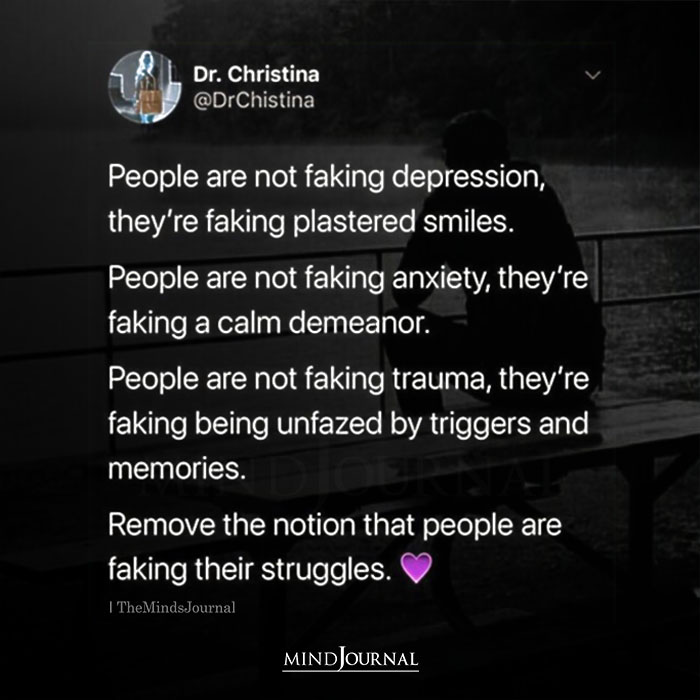
Treatment often only focuses on the individual, but what about those who are connected to them? What are family members and significant others supposed to do when their loved one is in emotional pain? How can they help? How can they care for themselves when caring for their loved ones?
How To Support A Loved One With Depression
Below you will find 10 steps to take when your loved one is depressed.
1. You are not enough.
The first thing you have to realize if you truly want to help your depressed loved one is that you are not enough. The love, help, support, and care you provide for your loved is important, but it’s not enough.
This is a difficult pill to swallow, yet it can also offer some relief. You are not enough because you shouldn’t be. Your loved one’s recovery shouldn’t rest entirely on your shoulders. It has been said that “it takes a village to raise a child.” Well, it also takes a village to help a depressed person recover.
Seek out support structures for your loved one so that you aren’t the only lifeline. Support structures can be anything: faith community, support groups, clubs, online gamer affiliations, depression forums, friends, family members, treatment groups, and mental health professionals.
You, as well, need a support structure. Don’t forget about your need for support as you support your depressed loved one.
2. Depression doesn’t define your loved one.
Depression can mute personality. However, the change isn’t permanent. Think of depression-like turning the volume dial down on a speaker. It’s still playing the same music, but at a diminished level.
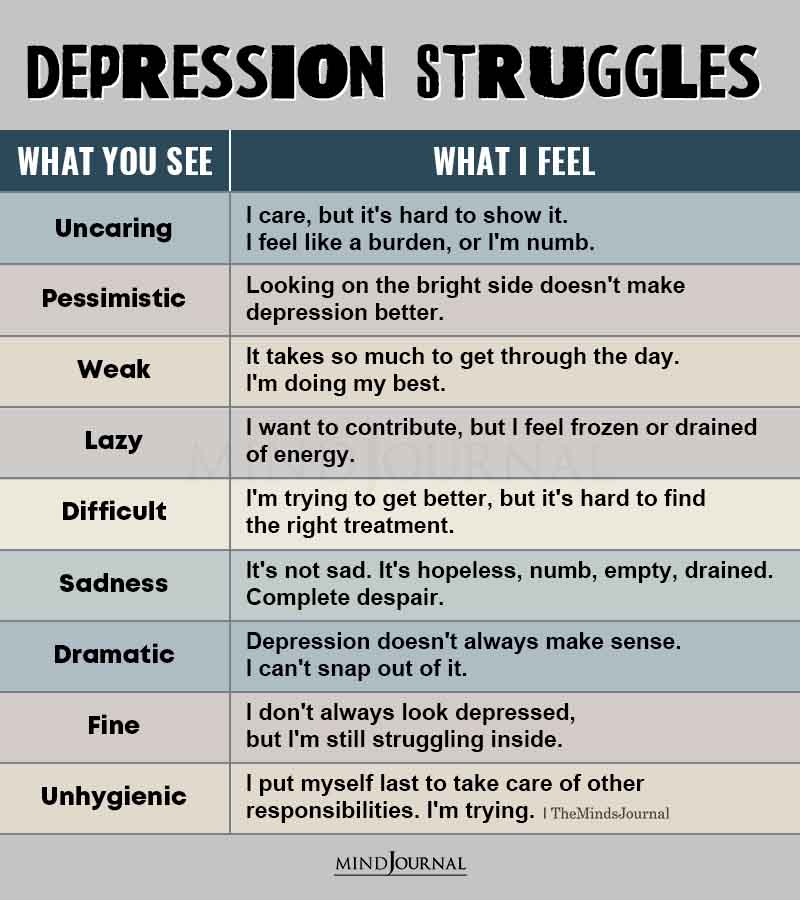
People recover from depression every day and regain their energy, motivation, and most importantly, their personality. That person you once knew is still there.
“Getting better from depression demands a lifelong commitment. I’ve made that commitment for my life’s sake and for the sake of those who love me.” —Susan Polis Schutz
Read: The Difference Between Self-Pity, Depression, or Perfectly Hidden Depression
3. Remember to take care of yourself.
Taking care of or living with someone who is suffering from depression can be emotionally taxing. It is not selfish for you to take care of yourself. There is an appropriate level of emotional distance that is healthy for your well-being and for your loved one.
Too much involvement in their mental illness can be a bad thing. Also, you are showing your loved ones how to take care of themselves when you take care of yourself.
4. Have patience.
Depending on what type of depression your loved one has, recovery will take a great deal of time. Bear in mind that recovery entails trial and error. Your loved one may try to overcome the depression and fail several times because depression compromises the motivation for healing.
Don’t compare your love to someone else who also has a mental illness and is motivated to heal and change. Without motivation for change, depression takes a long time to heal.
Therefore, have patience with your loved one and have patience with the process of healing. If they are taking medication, going to counseling, or attending a support group, allow time for these treatments to work.
5. Maintain a predictable and regular schedule.
Depression has a way of stalling life. It is like chewing molasses; it makes life slow and arduous. This affects your loved one and it affects you as well. Acknowledge it, but take steps so it doesn’t overwhelm your life.
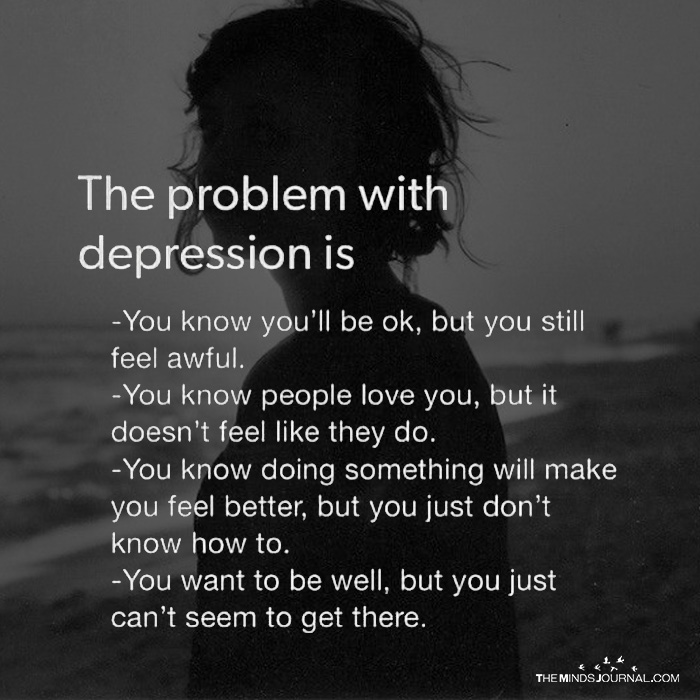
You can still have dreams, goals, and ambitions while taking the time to be there for your loved one. In fact, when your life is built on the foundation of structure, routine, and predictability, you create a stable environment. Stability is something your loved one needs when they feel like they are emotionally spiraling down.
6. Look for vicarious symptoms.

Since your loved one’s diagnosis or when they started showing signs of depression, have you noticed, in yourself, any of the following:
- Feelings of sadness, tearfulness, emptiness, or hopelessness
- Angry outbursts, irritability, or frustration, even over small matters
- Loss of interest or pleasure in most or all normal activities, such as sex, hobbies, or sports
- Sleep disturbances, including insomnia or sleeping too much
- Tiredness and lack of energy, so that even small tasks take extra effort
- Changes in appetite such as reduced appetite and weight loss, or increased cravings for food and weight gain
- Anxiety, agitation, or restlessness
- Slowed thinking, speaking, or body movements
- Feelings of worthlessness or guilt, fixating on past failures, or blaming yourself for things that aren’t your responsibility
- Trouble thinking, concentrating, making decisions, and remembering things
- Frequent or recurrent thoughts of death, suicidal thoughts, or suicide attempts
- Unexplained physical problems, such as back pain or headaches
If you are experiencing any of the aforementioned symptoms, take notice. A caregiver can experience vicarious effects of depression. This is a hazard to empathy.
We are so closely connected with a loved one who is depressed that we can start feeling depressed ourselves. Then what good are we to our depressed loved one and to ourselves?
Make sure to be consistent with self-care and mindful of depression symptoms. Take time for yourself to recharge your batteries. You may even need to seek out a counselor.
Read: What Are The Different Types Of Depression: A Complete Guide
7. Work with mental health professionals.
Mental Health professionals are trained in evidence-based treatments that can help those suffering from mental health disorders like depression. Counselors have expertise in depression and are effective at treating the disorder.
You were given this life because you are strong enough to live it. – Unknown
In addition to counseling, taking medication prescribed and monitored by a psychiatrist is an effective treatment. Counselors also run group therapy for depressed clients. These treatments work best in combination.
8. Be informed.
Learning as much as you can about the nature of depression can only help you and your loved one. Read, study, and research the causes of depression, symptoms, and treatments. Some of the causes may be:
- Stressful events such as the death of a loved one, unemployment, childhood trauma, divorce, or domestic violence
- A chronic medical condition such as diabetes, heart disease, or cancer
- Parents, siblings, or other family members with a history of depression
- Drug or alcohol abuse
Understanding the cause can help you, as a family member or significant other, support your loved one. They may have depression that is rooted in a medical condition like hypothyroidism. If that’s the case, they need to see a doctor.
If they are depressed due to drug addiction, they may need to be checked into an inpatient or outpatient treatment facility. If the cause is stress, they may need to see a counselor to work on effective stress management strategies. Identifying the cause of depression can be helpful in its treatment.
Recognize that your loved one may not have the same goals, ambitions, drives, and passions that they had before the depression. You will need to adjust your expectations. You won’t be able to depend on them like you once did. The support, love, and affection you received from them won’t be as readily available as it once was.
Depression makes people forgetful, absentminded, and lethargic. If you send them out shopping, they may come back without some of the items you requested. In social settings, they may not be as entertaining as they once were. This is not their fault. Don’t hold it against them.
10. Maintain hope.
The worst thing you can do is lose hope. Your loved one needs you now more than ever. They may be hopeless, but they can lean on your hope and belief.
Recovery from depression is possible; people do it every day. It takes a lot of hard work, patience, trial and error, treatment, and support, but it’s possible. The way of recovery may seem unclear but trust the process.
Life shrinks or expands in proportion to one’s courage. – Anais nIn
These 10 suggestions are intended to equip you with knowledge, understanding, and insight into your depressed loved one. Depression may feel like it has taken your loved one away, but it hasn’t.
But you need to accept them, depression and all. Recovery is not a sprint, it’s a marathon. So, better for you to be prepared and run the marathon the best you can.
It is a very natural instinct for you to want to support your depressed loved one, and give every effort to make them overcome depression. The process might not be that easy, but isn’t that what love is? Supporting the one you love no matter what, and always wanting what is best for them.
Check out Daniel’s author page and his works on Amazon:
https://www.amazon.com/-/e/B00OC8Z40W
Written By Dan Bates, LMHC, MAML
Originally Appeared In Psychology Today
Supporting someone with depression is always a tough thing to deal with, and what makes it more difficult is the stigma attached to it. Even though things are changing and more people are taking this seriously, we still have a long way to go. However, not a lot of people know how to handle and support people going through depression, due to the lack of awareness and knowledge.
